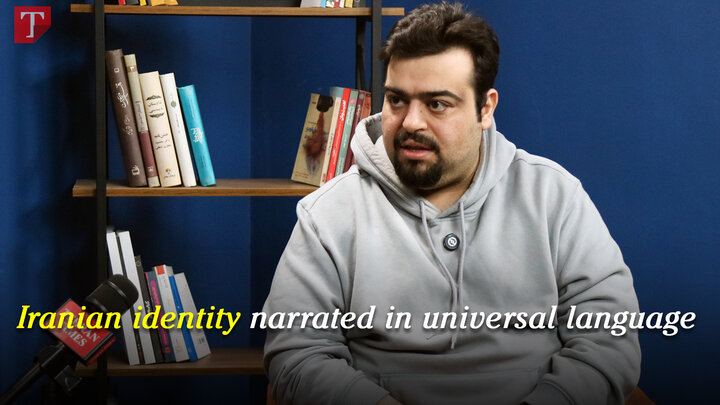-
 2026-01-21 21:01
2026-01-21 21:01
From ‘dirty work’ to ‘great things’: How Europe became America’s lackey
By Saleh Abidi Maleki
TEHRAN – “Do you still believe that by helping the United States commit its crimes we will be safe?” Irene Montero, Spain’s representative in the European Parliament, asked her colleagues this week. It was not a rhetorical flourish so much as an indictment.
-

3,117 people were killed in recent riots in Iran: official announcement
TEHRAN – The Legal Medicine Organization released a report on Wednesday evening announcing that 3,117 people were killed in the recent violent protests in Iran.
-

By Xavier Villar
Beyond Trump: The structural roots of the conflict with Iran
MADRID - Across much of the coverage of the latest escalation between the United States and Iran, a reassuringly simple explanation has taken hold. The problem, it is suggested, has a proper name. Donald J. Trump, with his confrontational style, his contempt for multilateral agreements and his preference for displays of force, is portrayed as the primary figure responsible for pushing the bilateral relationship to the edge of the abyss.
-

The legal accountability of a brazen interference: US must be held accountable
By Seyyed Abbas Araghchi, Iranian Foreign Minister
Recent organized terrorist operations carried out in line with and following the imposed 12-Day war against the Islamic Republic of Iran have once again revealed the true nature of the United States' behavior toward Iran. However, beyond this, a fundamental question arises in the realm of international relations: Can governments continue to openly interfere in the internal affairs of other countries without paying a price?
-

By Fatemeh Kavand
A Pahlavi souvenir in the final clash inside the Western think tank
TEHRAN - The main project of the expatriates and the Western–Hebrew think tank behind the recent unrest in Iran, from its very beginning on Dey 18 (January 8), was not merely to create disorder and insecurity, but rather to wait for feedback on the level of violence and to increase the number of casualties.
-

By staff writer
Fox in the henhouse: Trump’s ‘Board of Peace’ lets Bibi off the leash
TEHRAN — The decision to include Prime Minister Benjamin Netanyahu on a so-called U.S.-led “Board of Peace” for Gaza highlights the deep incoherence of Washington’s approach to Israel’s war against the enclave and its aftermath.
Politics
-

People’s demands should be addressed: Pezeshkian
TEHRAN - Iranian President Masoud Pezeshkian has called on the country’s Supreme National Security Council to work out proper methods to prioritize and address people’s demands and protests.
-

Armed forces in high spirits and quite ready to defend Iran: IRGC deputy chief
TEHRAN – Iran's armed forces are prepared for any confrontation following military threats by the United States, Ahmad Vahidi, deputy head of the Islamic Revolutionary Guard Corps, has said.
-

US treasury chief admits sanctions intended to fuel unrest in Iran
TEHRAN – U.S. Treasury Secretary Scott Bessent has openly acknowledged the role of American sanctions in destabilizing Iran’s economy and fueling public unrest, describing the sanctions as a form of “economic statecraft” that had contributed to recent riots in Iran.
Sports
-

Iran beat India in 2026 Asian Handball Championship
TEHRAN – Iran defeated India 39-16 in Group IV of the 2026 Asian Handball Championship on Thursday.
-

Remembering Sirous Ghayeghran: A gentle legend of Iranian football
TEHRAN - Sirous Ghayeghran’s anniversary arrives like a quiet tide rolling back to shore. Born in 1962 in Bandar Anzali, he grew up with the harbor’s rhythm guiding his feet and the sea’s patience teaching him restraint.
-

Iran’s Faraji wins WTT Youth Contender Doha 2026
TEHRAN – Benyamin Faraji of Iran won the title at the WTT Youth Contender Doha 2026 on Tuesday.
Culture
-

Iranian concerned visual artists create works regarding recent unrest
TEHRAN – Iranian visual artists have created artworks regarding the recent unrest in the country, which started with protests over currency market volatility among Iran’s bazaaris, but the peaceful demonstrations were exploited by the U.S. and Israel and, supported by the foreign regimes, devolved into systemic urban terrorism in an effort to overthrow the Islamic Republic.
-

Iranian cultural, media leaders reaffirm national unity
TEHRAN- A broad coalition of prominent cultural and media figures in Iran issued a statement on Wednesday, denouncing U.S. interference in Iran's internal affairs and calling for national unity.
-

Veteran actor, singer Reza Rooygari passes away
TEHRAN – Veteran Iranian actor, singer Reza Rooygari died of a heart attack at the age of 75 in Tehran on Wednesday.
Economy
-

Major infrastructure projects inaugurated in Chabahar Port
TEHRAN – Iranian Transport and Urban Development Minister Farzaneh Sadegh inaugurated and ordered the beginning of 14 major infrastructure and equipment projects worth 98 trillion rials (about $196 million) in Chabahar Port on Thursday.
-

Installed capacity of Iran’s renewable power plants exceeds 3,700 MW
TEHRAN - The head of Iran's Renewable Energy and Energy Efficiency Organization (SATBA) said the installed capacity of the country's renewable power plants has exceeded 3,700 megawatts.
-

Iran-Algeria trade increases by 5 folds in 8 months yr/yr
TEHRAN- The value of trade between Iran and Algeria rose by five folds during the first eight months of the current Iranian calendar year (March 21-November 21, 2025), as compared to the same period of time in the past year, according to the head of Iran Trade Center in Algeria.
Society
-

‘Transportation renewal best way to address air pollution’
TEHRAN – Shina Ansari, the head of the Department of Environment (DOE), has said that the aging transportation fleet is a major source of air pollution in the country, so renewing the transportation system is the best way to deal with the problem.
-

IRCS rescues over 7,000 people from snowstorm
TEHRAN – Over the past three days, the Iranian Red Crescent Society (IRCS) has provided rescue services to 7,738 people affected by floods and snow blizzards in the country.
-

Over 1200 cases of dengue reported in 11 months
TEHRAN – Since the beginning of the current Iranian year (March 21, 2025) till January 21, a total of 1209 cases of dengue fever have been diagnosed in the country, according to the health ministry.
Tourism
-

Water leaks, ground subsidence raise concerns at Isfahan’s UNESCO-listed mosque
TEHRAN - Iranian authorities and heritage experts are racing to contain what they describe as a structural threat to parts of the UNESCO-registered Jameh Mosque of Isfahan, also known as the Atiq Mosque, after a limited ground subsidence, water leakage and rising moisture were detected around one of the world’s most important Islamic monuments.
-

19th-century sarays in Rasht bazaar damaged in unrest
TEHRAN - Three 19th-centry sarays dating back to Qajar period have been damaged after a fire broke out at the historical bazaar in northern Iran during unrest last week, officials said.
-

Mashhad combines pilgrimage with tourism and urban infrastructure
TEHRAN - Mashhad, the capital of Khorasan Razavi province, is one of Iran’s main domestic travel destinations, drawing millions of visitors each year for religious, cultural and leisure purposes.
International
-

Fox in the henhouse: Trump’s ‘Board of Peace’ lets Bibi off the leash
TEHRAN — The decision to include Prime Minister Benjamin Netanyahu on a so-called U.S.-led “Board of Peace” for Gaza highlights the deep incoherence of Washington’s approach to Israel’s war against the enclave and its aftermath.
-

Israeli wars deepen domestic anxiety
TEHRAN – Rather than increasing settlers’ sense of security, the Israeli regime’s aggression across the region has had the opposite effect.
-

Trump’s Greenland obsession turns Davos into a test of Europe’s resolve
TEHRAN — President Donald Trump’s appearance at the World Economic Forum in Davos on Wednesday was a display of geopolitical brinkmanship, delivered with the swagger of a leader who treats alliances as leverage rather than partnerships.
Most Viewed
-
3,117 people were killed in recent riots in Iran: official announcement
-
From ‘dirty work’ to ‘great things’: How Europe became America’s lackey
-
Beyond Trump: The structural roots of the conflict with Iran
-
Fox in the henhouse: Trump’s ‘Board of Peace’ lets Bibi off the leash
-
The legal accountability of a brazen interference: US must be held accountable
-
A Pahlavi souvenir in the final clash inside the Western think tank
-
People’s demands should be addressed: Pezeshkian
-
US treasury chief admits sanctions intended to fuel unrest in Iran
-
POGC rises gas extraction from South Pars phase 11
-
Iranian concerned visual artists create works regarding recent unrest
-
Sunni clergy voice support for Iran’s ruling system and Leader
-
Veteran actor, singer Reza Rooygari passes away
-
Armed forces in high spirits and quite ready to defend Iran: IRGC deputy chief
-
11 terrorists arrested, another killed in southeast Iran
-
Over 2,000 production units introduced to receive working capital












